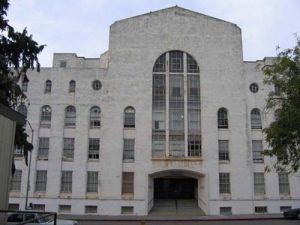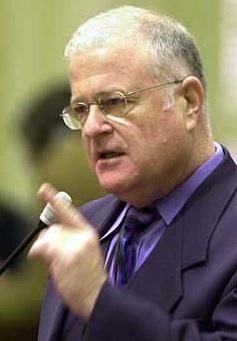| HOME | THE PURPOSE OF THIS WEBSITE | PERATA IN THE NEWS | THOUGHTS AND ANALYSES | WHAT OTHERS ARE SAYING | THE FEDERAL CORRUPTION INVESTIGATION |
|---|
| THE OAKLAND SCHOOL TAKEOVER | PERATA AND THE POLICE LAYOFFS | BUYING THE OAKLAND MAYOR'S RACE | THE VIDEOS | POST-ELECTION COVERAGE | STATEMENT OF RESPONSIBILITY |
|---|



An independent website not affiliated with any political officeholder or candidate or political campaign
(Left to right: OUSD Paul Robeson Administration Building, Lake Merritt Channel, TerraMark's proposal for high-rise development on the OUSD administration building property, State Senator Don Perata)"Leadership in action": Don Perata and the state takeover of the Oakland Unified School District
What was Don Perata's record in the California state takeover of the Oakland Unified School District?
It's an important issue for Oakland voters making up their minds on who they want for the next mayor of the City of Oakland. The Oakland school takeover was the greatest crisis in Oakland government in more than a generation. Understanding what Don Perata did—or did not do—before and during the school takeover would be very helpful in understanding what Don Perata would do—or not do—if he were elected Oakland mayor.
In a section called "Delivering Results—Leadership In Action," Perata's "Believe In Oakland—Perata For Mayor" campaign website describes Perata as the savior of the Oakland schools, stating simply that Perata "rescued Oakland Unified School District from bankruptcy and further financial mismanagement in 2003."
But newspaper articles and columns written during the time of the state school takeover—most by journalist/columnist J. Douglas Allen-Taylor for the Berkeley Daily Planet newspaper and one by East Bay Express investigative reporter Robert Gammon when he was writing for the Oakland Tribune—show a far different role played by Don Perata.
It is true that Don Perata was the driving force behind the 2003 state takeover of the schools. Perata authored and sponsored the SB39 state legislation that authorized the takeover.
But the column "Suspicious Minds" below shows that the 2003 bill was actually the second time Don Perata tried to force a takeover of the Oakland schools. The first was in 1998 and 1999 when Perata introduced SB564, the state legislation that would have authorized then-Oakland Mayor Jerry Brown to appoint a trustee to run the Oakland schools. But Perata quietly dropped SB564 in 2000 after he got what he and Jerry Brown wanted, the resignation of then-OUSD Superintendent Carol Quan. That resignation eventually led to the hiring of Superintendent Dennis Chaconas, who was then ousted when Perata's 2003 SB39 law went into effect three years later.
Was Perata's motivation in his two Oakland school takeover bills to save the Oakland schools and protect our children's education?
At least two of the articles ("One Of Oakland's Greatest Public Scandals" and "Phone Logs Link 'Politics' To School Takeover") show that Perata and his political allies blocked attempts the Oakland School District to balance its budget in 2003 without the state loan and the state takeover.
And the article "Who Was Looking Out For Oakland's Schools, And Who Was Not?" shows that once the state took over Oakland Unified, Perata seemed to lose all interest in the Oakland schools. Perata failed to use his position as the president of the California State Senate, Oakland's state senator, and the SB 39 takeover legislation author to monitor the situation in the schools and make sure the state was doing its job in educating Oakland's children and properly managing Oakland's school funds. While all evidence showed that education in Oakland was declining and the budget was spinning out of control under state operation, Perata did nothing to help. And the "Looking Out" article shows that it was Assemblymember Sandré Swanson who eventually stepped in after taking office in 2007, forcing the state to do its job, protecting the Oakland schools, and beginning the process to regain local control. Swanson showed leadership in the Oakland school crisis. Don Perata did not.
Rather than saving the Oakland schools from bankruptcy, as his mayoral website claims, the record shows that Don Perata pushed the Oakland schools toward financial ruin, blocking the district's attempts to save itself without state funds. But if that is true, and if Don Perata did not seem interested enough in the Oakland schools to intervene during the crisis years of full state control, why did Perata push so hard for the state takeover in the first place?
The articles and columns below show that Don Perata's interest in the Oakland school takeover may have been more about valuable Oakland school property than about helping the schools or the children. The Oakland school district holds several parcels of property on the Lake Merritt Channel that include the district administrative headquarters and several educational institutions. A provision to allow the property sale kept showing up in Perata's Oakland school takeover bill while it was being debated in the legislature, and made its way into the final law ("The Curious History Of The OUSD Land Sale As Told In The Legislative Record".
In fact, California State Superintendent Jack O'Connell did try to sell the Oakland school property to private developers while the district was under full state control. The State Superintendent was prevented from selling it only through determined action by a coalition of Oakland residents and political leaders.
Did Don Perata "rescue Oakland Unified School District from bankruptcy and further financial mismanagement in 2003," as his mayoral campaign website says?
We don't think so. Instead, we think the articles below show strong evidence that Don Perata caused turmoil in the schools, pushing the district towards bankruptcy by blocking any means for the district to save itself. Why? Although there is no "smoking gun" evidence in the articles that presents absolute proof, the articles lead to the reasonable conclusion that the real purpose of the state takeover was an attempt to push the sale valuable district property to real estate developers. Meanwhile, there is no doubt from the articles that Don Perata bailed out on the school district's problems when his leadership was most needed during the darkest years of the state school takeover, and others like Sandré Swanson had to pick up the tasks that Perata should have done.
Don Perata's role in the Oakland school takeover is a complicated and largely-misunderstood story that unraveled slowly, and even now, all of the facts have yet to come out.
But we invite Oakland residents and voters to read the articles below, and make up your own mind if this is the type of leadership we need in the Oakland mayor's office.



